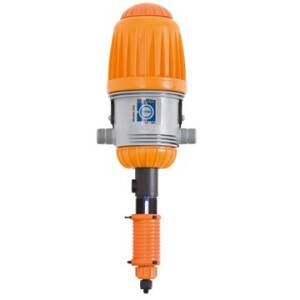Frequently Asked Questions (FAQs)
Fertilization ensures that plants receive all the nutrients they need for growth and health. By combining fertilization and irrigation, nutrients are transported directly to the roots, increasing efficiency. This results in stronger plants and richer flowering. In addition, a balanced nutrient supply can strengthen the plants' resistance to disease and improve soil quality in the long term.
Organic fertilizers come from natural sources and improve soil structure in the long term. They promote the development of beneficial microorganisms in the soil and encourage soil health. They also ensure healthy and fertile soils and improve the yield and taste of your harvest. When used correctly, fertilizers can help protect the environment and promote sustainable agriculture.
Liquid fertilizers can be fed directly into the irrigation system via special fertilizer units. This method, known as fertigation, allows for precise dosing of nutrients. It is important to follow the manufacturer's instructions and maintain the system regularly to avoid blockages in the filter. This will ensure that your plants receive a consistent and tailored supply. The concentration of the fertilizer should also be optimally adjusted to prevent overfertilization.
The frequency of fertilization depends on the type of fertilizer, the irrigation system, and the specific needs of your plants. Slow-release fertilizers are typically applied once or twice per season, while liquid fertilizers can be applied more frequently, often weekly or biweekly. It is advisable to follow the fertilizer manufacturer's recommendations and to observe the plants regularly to determine their needs. The right amount of water plays a crucial role in this.
Yes, combining organic and mineral fertilizers can be useful. Organic fertilizers improve the soil structure and promote soil life, while mineral fertilizers provide quickly available nutrients. By combining both types of fertilizer, you can benefit from the advantages of both approaches and ensure a balanced nutrient supply. The important thing is to take the plants' requirements into account.
A soil analysis provides information about the current nutrient content, pH value, and water storage capacity of the substrate. Based on this information, you can add the nutrients you need in a targeted manner and avoid overfertilization. This promotes optimal plant growth while protecting the environment.
To avoid overfertilization, it is important to follow the fertilizer manufacturer's dosage recommendations exactly. Regular soil analysis helps to determine the current nutrient requirements. In addition, the use of fast-dissolving fertilizers should be used with caution to prevent the accumulation of nutrients in the soil. The proper use of accessories such as filters and controllers can help optimize irrigation and fertilization.
The right planning for efficient fertilization in irrigation
When planning your garden irrigation, choosing the right fertilizer is crucial. It is important to know your plants' nutrient needs and select fertilizers that match them. Solid organic fertilizers have the advantage of providing long-term benefits and improving soil structure. They promote the development of beneficial microorganisms and ensure healthy soil. Liquid fertilizers, on the other hand, provide a quick supply of nutrients and can be easily integrated into irrigation systems. By adding fertilizer to the irrigation water, you can efficiently and evenly supply your plants with nutrients in the required quantities. At DVS Beregnung, you will find a selection of high-quality fertilizers that are specifically designed for integration into irrigation systems. With our DVS irrigation planner, you can plan your irrigation individually, taking optimal account of fertilization. Our Plug&Rain® modular system makes installation easier for you, as many assemblies are pre-assembled. This way, you can ensure that your plants always receive the right amount of water and nutrients.
What is fertigation?
Fertigation is an innovative method of plant nutrition in which nutrients are administered directly to the plants via the irrigation system. This technique combines fertilization and irrigation in a single step, enabling precise and efficient nutrient delivery. With fertigation, the nutrients reach the plant roots directly, allowing them to be absorbed more quickly and effectively. Unlike traditional fertilization methods, which spread nutrients over the soil, fertigation offers the advantage of being able to administer nutrients in a targeted and needs-based manner. This results in healthier plant growth and better use of available resources.
Benefits of fertigation
Fertigation offers numerous advantages for garden irrigation and agriculture. Here is an overview of some of the most important benefits:
- Precise nutrient delivery: Nutrients are delivered directly to the plant roots, enabling efficient and targeted fertilization.
- Reduced nutrient loss: By delivering nutrients directly, the loss of nutrients through leaching or evaporation is minimized.
- Improved plant growth: Targeted nutrient delivery promotes healthy plant growth and can increase yields.
- Water savings: Since nutrients are delivered directly to plants, less water is needed, making irrigation more efficient.
- Environmentally friendly: fertigation reduces nutrient emissions into the environment, contributing to more sustainable agriculture.
These advantages make fertigation an attractive option for gardeners and farmers who want to provide their plants with optimal care while protecting the environment.
Easy installation and long-lasting use of fertilizer units
The integration and connection of fertilizer units into your irrigation system enables precise and automated nutrient supply. When installing, it is important to place the fertilizer unit at a point in the system where the fertilizer is distributed evenly. Make sure that the materials used are resistant to the fertilizers used to avoid corrosion. Regular maintenance of the fertilizer unit is essential to prevent blockages and ensure even fertilizer distribution. It is recommended to use filters to remove particles from the fertilizer and to maintain the long-term functionality of the system. With the right solutions and a well-thought-out plan, you can ensure an optimal nutrient supply for your plants.
 Free Online Irrigation-Planner
Free Online Irrigation-Planner




